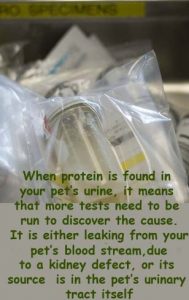Ron Hines DVM PhD
 See What Normal Blood & Urine Values Are
See What Normal Blood & Urine Values Are
 Causes Of Most Abnormal Blood & Urine Tests
Causes Of Most Abnormal Blood & Urine Tests
Protein In Your Dog Or Cat’s Urine = Proteinuria
Ideally, there will be little or no protein in your dog or cat’s urine sample. Blood has lots of protein; the job of your pet’s kidneys are to filter out waste and excess fluid. But health kidneys do not let protein pass into the urine.
Placing a chemically treated strip of paper (a urine “dipstick”) in a sample of your pet’s urine to screen for urinary tract problems is one of the most common tests that veterinarians run. One section of those strips measures (only a rough measurement) the amount of protein that is present in the urine. The results are usually reported as negative, trace, 1+ all the way up to 4+.
The big problem with this test is that the more dilute your pet’s urine sample is, the less protein will be in it. And the concentration of its urine varies throughout the day depending on how much water your pet it drank. To get around that, vets follow up suspicious dipstick results with a urine protein to creatinine ratio test (P:Cr) and other tests. The ratio of those two compounds remains stable in dilute and concentrated urine.
Normal kidneys are quite efficient in not allowing protein to enter your dog or cat’s urine as they filter toxins and excess fluids out of its blood stream. So, when your vet discovers more than a trace of protein is present in your dog or cat’s urine sample, something might be amiss in its urinary tract. However, this test for protein is not very accurate – false negatives and false positives are common. It also does not tell your veterinarian where in the urinary track the leakage is occurring. So, when the test is positive, it is common for your veterinarian to suggest further testing to determine the underlying cause. Looking at the other urinalysis results can give a clue. When bacteria are seen or too many white blood cells are present. An infection, in the tract itself rather than kidney leakage might be the cause. The vet’s physical exam, imaging studies or the dog or cat’s blood chemistry values often give additional clues as well.
Why Your Cat or Dog’s Urine Might Contain Too Much Protein:
High specific gravity (= very concentrated urine) makes small amounts of protein leakage appear greater than they really are. The opposite is also true; protein of any amount in very dilute urine is a more worrisome finding than the same amount in a concentrated urine sample. That is why the urine protein:creatinine ratio is a considerably better test.
The two most common reasons for protein in a pet’s urine are a urinary tract infections (UTIs) (particularly in female pets) and kidney failure (= CRD) in older pets. (read here)
In younger pets, the most common reason for substantial protein in their urine is a urinary tract infection. That could be a simple UTI, particularly in female, spayed dogs or a UTI that has occurred as the result of urinary tract stones (calculi) like struvite or oxalate (Any pet with a positive urine protein reaction due to a UTI or a urinary tract stone will be likely to show urination behavior changes as well). Because the urinary and reproductive tract have a common exit in females, infections of the reproductive tract (pyometra) in an un-neutered female pet can also cause positive urine protein tests as well. So can or the prostate gland problems in older, unneutered male pets.
Blood also contains a lot of protein. Therefore, if blood is leaking into your pet’s urine from any location and for any reason, your pet’s urine will be positive for protein as well as blood. In such situations, the area of the dipstick that detects blood should also be positive.
In older pets, the most common cause for protein-positive urine is chronic kidney disease. Kidneys are often the first organs to fail in elderly pets. The worn, scarred kidneys of these elderly pets can no longer hold back the blood proteins that pass through them. The microalbuminuria test that I mentioned earlier warns veterinarians of this problem much earlier than a simple dipstick protein-positive reaction.
Another fairly common cause of mild to moderate amounts of protein in the urine of older pets is a failing heart. In that situation, abnormally sluggish blood flow through the pet’s kidneys leads to kidney loss of function. That can be responsible for mild-to-moderate protein leakage into the pet’s urine as well.
Small amounts of protein in the urine is normal in infant dogs and cats due to the immaturity of their kidneys. Protein can also be present in the urine when certain tumors of the blood (plasmacytoma, multiple myeloma, etc.) are present and when red blood cells are being destroyed in the general circulation (intravascular hemolysis).
Certain antibiotics (e.g. gentamycin) and other medications such as those given to dogs for arthritis (NSAIDs) can be toxic to the kidneys (nephrotoxic meds). That is particularly true when NSAIDs are given to cats. (read here) When that occurs, the sudden or gradual kidney damage they caused can cause your pet to leak protein into its urine.
The myoglobin contained in muscle and the hemoglobin contained in red blood cells are rich in protein. So, diseases and conditions that destroy blood or muscle within the body can cause a spillover of those proteins into your pet’s urine. Myoglobin, as well as hemoglobin, cause the same portion of the urine dipstick to become positive (i.e. myoglobinemia and intravascular hemolysis). Strenuous exercise resulting in myoglobinuria (rhabdomyolysis) or high fevers will occasionally cause protein-positive urine as well.
Sudden kidney disease (acute nephritis) from infections or toxins will also allow protein to spill into your pet’s urine.
There are many other health conditions that eventually affect the health of your dog or cat’s kidneys. Any of them can cause enough kidney damage to make the kidneys leak protein.
Things that contribute to false positive protein results include: leaving the dipsticks in contact with urine for too long, soaps used to clean urine collection or transport containers, very high (= alkaline = basic) pH urine. Glucose-positive urine can be false-negative for protein on dipstick tests.
Read my explanation of microalbuminuria for other possible causes of protein-positive urine in your pet.
In cats, elevated blood pressure in cats has been associated with increases in urine protein. So has hyperthyroidism or corticosteroid administration.
Complementary Tests That Come To Mind:
Complete urinalysis, CBC/ WBC and blood chemistry panel, urine protein:creatinine (UP:C) ratio, bacterial culture of urine and antibiotic sensitivity, imaging, blood pressure test In cats, T4
You can see the flow chart that shows how veterinary students at the University of California are currently taught to discover the causes of high urine protein here 
DxMe
You are on the Vetspace animal health website
Visiting the products that you see displayed on this website help pay the cost of keeping these articles on the Internet.


